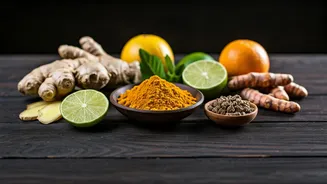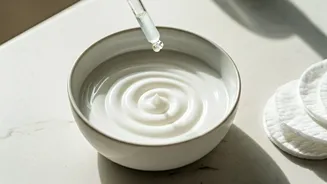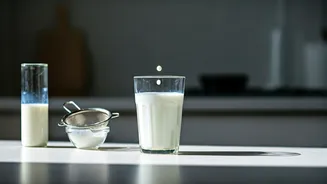Hydration is Key
One of the most immediate needs after a night of drinking is rehydration. Alcohol is a diuretic, which means it causes your body to lose fluids more rapidly,
leading to dehydration. Headaches, fatigue, and dizziness often accompany dehydration. To combat this, focus on replenishing fluids. Water should be your primary choice; aim to drink at least eight glasses. Coconut water is another excellent option because it contains electrolytes like potassium and sodium, which are lost when you drink alcohol. Electrolyte drinks can also help. Incorporating hydrating fruits and vegetables, such as watermelon, cucumber, and oranges, can further aid in rehydration because they are naturally rich in water. Avoid sugary drinks and excessive caffeine, as they can worsen dehydration. Staying hydrated helps flush out toxins, restore balance, and significantly ease the feeling of being unwell.
Embrace Herbal Teas
Herbal teas offer a soothing and supportive way to recover from the aftermath of excessive alcohol consumption. Several herbal infusions are known for their detoxifying properties and ability to ease discomfort. Ginger tea is renowned for its anti-nausea effects, and it can calm an upset stomach. Chamomile tea has relaxing qualities that can help reduce anxiety and promote better sleep, essential after a night of celebration. Peppermint tea aids digestion and can relieve headaches that are often linked to a hangover. Milk thistle tea supports liver function, which is crucial as the liver works hard to process alcohol. Dandelion tea is another beneficial option; it aids in detoxifying the liver and the kidneys. Prepare these teas using hot water and steep the herbs for about 5 to 10 minutes. Consider adding a touch of honey or lemon to enhance the taste and provide additional benefits.
Nourishing, Soothing Foods
The foods you consume after a night of drinking can significantly impact your recovery. Opt for easily digestible, nutrient-rich foods to help restore your body’s balance. Bland foods, like toast, crackers, and plain rice, can be gentle on your stomach and prevent further irritation. Bananas, with their high potassium content, can combat the electrolyte imbalance caused by alcohol. Eggs are a great source of protein, helping to stabilize blood sugar levels and combat fatigue. Soups, particularly those with vegetables and broth, provide hydration and essential nutrients while being easy to digest. Avoid greasy, heavy foods that can make you feel worse. Instead, choose foods rich in antioxidants and vitamins. Including fruits and vegetables, such as berries, spinach, and avocados, will support your body’s recovery processes and reduce inflammation. Eating small, frequent meals rather than large ones also helps.
Prioritize Rest and Sleep
Getting enough rest is paramount when recovering from the effects of alcohol. Alcohol can disrupt sleep patterns, leaving you feeling tired and run-down. Prioritizing quality sleep can help your body repair itself and recover more efficiently. Create a relaxing sleep environment; ensure your room is dark, quiet, and cool. Aim for at least seven to nine hours of sleep. If you find it difficult to fall asleep, try taking a warm bath or shower before bed, or use relaxation techniques such as deep breathing or meditation. Avoid using electronic devices like phones or tablets before bed, as the blue light they emit can interfere with sleep. Allow your body sufficient time to recuperate and recover from the previous night's activities. A well-rested body will be better equipped to handle the symptoms of a hangover and bounce back to normal.
Gentle Exercise, Fresh Air
While it might seem counterintuitive to exercise when feeling unwell, engaging in light physical activity can help speed up your recovery. Gentle exercise, such as a short walk or some light stretching, can boost circulation and help your body eliminate toxins. Fresh air also plays a crucial role; being outdoors can increase oxygen levels and promote a sense of well-being. Avoid strenuous exercise, as it can worsen dehydration and fatigue. A brisk walk in a park or a relaxed session of yoga can boost your mood and energy levels without overtaxing your body. Remember to stay hydrated during exercise by drinking plenty of water. The combination of gentle movement and fresh air can significantly contribute to a faster recovery. This approach helps reduce the sluggishness that often accompanies a hangover and encourages a sense of revitalization.
Supplements to Consider
Certain supplements can aid in the recovery process after consuming alcohol. Vitamin B supplements, particularly B1 and B12, are crucial because alcohol depletes these vitamins. B vitamins help support your body's energy levels and neurological functions, which can be affected by alcohol. Milk thistle, as mentioned before, is an excellent liver support supplement. It helps protect the liver from damage and promotes detoxification. Taking glutathione supplements can also be helpful; this is a powerful antioxidant that supports liver function and helps remove toxins. Electrolyte supplements, especially those containing potassium and magnesium, can replenish the electrolytes lost due to alcohol's diuretic effects. Always consult with a healthcare professional before starting any new supplements. They can provide personalized advice based on your health needs and ensure that the supplements won't interact negatively with any medications you might be taking.















